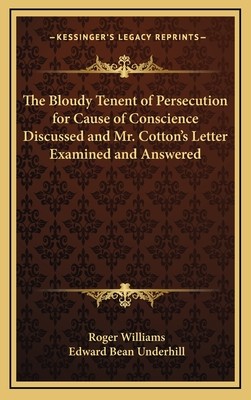
- We will send in 10–14 business days.
- Author: Roger Williams
- Publisher: Kessinger Publishing
- ISBN-10: 116320207X
- ISBN-13: 9781163202074
- Format: 15.2 x 22.9 x 3.2 cm, kieti viršeliai
- Language: English
- SAVE -10% with code: EXTRA
The Bloudy Tenent of Persecution for Cause of Conscience Discussed and Mr. Cotton's Letter Examined and Answered (e-book) (used book) | bookbook.eu
Reviews
Description
1848. Rogers was one of the Seekers, a group that adhered to no specific religious practices. It is as a Seeker that he wrote The Bloudy Tenent, while in England attempting to win back the charter for Rhode Island, his enclave of religious toleration amidst the intolerance of the Puritans. Williams' belief, and the main theme of The Bloudy Tenent, was that all individuals and religious bodies were entitled to religious liberty as a natural right, and that civil governments did not have the authority to enforce religious laws. The Bloudy Tenent is structured as a type of dialog between Truth (as seen by Puritans like John Cotton) and Peace (Williams' view) over the issue of Persecution, for Cause of Conscience (namely, the issue of laws favoring one religion over another, and their validity from a scriptural point of view.) It was Williams' thesis that these laws, or any use of secular authority to promote any religious sect, was contrary to the teachings in the Bible. To do so, in Williams' view, was to fall prey to the same error as the tenants in the biblical parable, who killed the son of the landowner in order to lay claim to his property. The Bloudy Tenent is considered to be significant among the works of this period. See other titles by this author available from Kessinger Publishing.
EXTRA 10 % discount with code: EXTRA
The promotion ends in 23d.05:38:03
The discount code is valid when purchasing from 10 €. Discounts do not stack.
- Author: Roger Williams
- Publisher: Kessinger Publishing
- ISBN-10: 116320207X
- ISBN-13: 9781163202074
- Format: 15.2 x 22.9 x 3.2 cm, kieti viršeliai
- Language: English English
1848. Rogers was one of the Seekers, a group that adhered to no specific religious practices. It is as a Seeker that he wrote The Bloudy Tenent, while in England attempting to win back the charter for Rhode Island, his enclave of religious toleration amidst the intolerance of the Puritans. Williams' belief, and the main theme of The Bloudy Tenent, was that all individuals and religious bodies were entitled to religious liberty as a natural right, and that civil governments did not have the authority to enforce religious laws. The Bloudy Tenent is structured as a type of dialog between Truth (as seen by Puritans like John Cotton) and Peace (Williams' view) over the issue of Persecution, for Cause of Conscience (namely, the issue of laws favoring one religion over another, and their validity from a scriptural point of view.) It was Williams' thesis that these laws, or any use of secular authority to promote any religious sect, was contrary to the teachings in the Bible. To do so, in Williams' view, was to fall prey to the same error as the tenants in the biblical parable, who killed the son of the landowner in order to lay claim to his property. The Bloudy Tenent is considered to be significant among the works of this period. See other titles by this author available from Kessinger Publishing.


Reviews